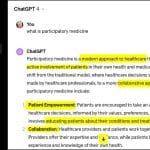Nancy B. Finn is a journalist with an expertise in the implementation of digital communications in health care. This is her second guest post on e-patients.net:
When an individual patient visits his or her doctor with a problem, traditional clinical diagnosis is made and treatment is administered based on the patient’s symptoms, medical and family history and results of lab tests.
In the e-health world of the 21st century, personalized medicine, a new approach to treatment and analysis of patients’ health issues, promises to revolutionize that process. Personalized medicine looks not only at an individual’s symptoms, labs and medical history but at the individual’s unique clinical genetic and genomic markers to determine a treatment program. Because these factors differ for each human being, the disease they carry and how they will respond to treatment will differ as well. Taking this to another level, personalized medicine enables doctors to make accurate predictions and assumptions not only about an existing condition but to make predictions about a person’s potential to develop a disease. This will enable clinicians to treat patients proactively rather than reactively resulting in a better outcome.
Personalized medicine is gathering momentum as evidenced by the significant attendance and enthusiastic involvement of the participants at the recent conference sponsored by Harvard Medical School and The Center for Genetics and Genomics at Partners Healthcare. Although there was general agreement that personalized medicine is now an accepted way to look at the patient, there are also enormous barriers to its widespread use, including:
· Economic factors such as who will receive and who will pay for genetic testing.
· Issues regarding who will be responsible for building the infrastructure needed to support widespread deployment,
· Concerns about how we amass, use, and protect the vast knowledge base that results from genetic tests.
· Legal questions regarding who owns the genetic test data – the patient, the physician, the institution – and whether or not that information can be used for additional research.
· Unresolved issues regarding standards upon which to build a platform for using personalized medicine
· Discussions about how to structure collaborations amongst all the stakeholders (patients, physicians and scientists) so that personalized medicine advances are translated ultimately into better patient care.
E-patients must be part of the conversation that determines where we are going with personalized medicine because personalized medicine uses genomics to focus not only on disease identification tied to a specific combination of genes in an individual, but also on disease prevention and wellness in which everyone has a high stake.






If you click through to the Harvard Medical School link, you’ll see a Student Scene story by Kristin Huang about how her “church has become a window into the world of my patients.”
What stories might be told on the Center for Genetics and Genomics to humanize their work? Would a story like Jessica Queller’s book, Pretty is What Changes help connect people to the research? How about Judy Feder’s comment on this post?
There is an interesting post and response by the head of The American College of Pathology on The Great Kibbe Debate on IT technology on The Health Care Blog and referenced here.
Worth revisiting.
Visionary use of IT. Works for pathologists who seem more at the cutting edge of IT, but absolutely drives other camps nuts.